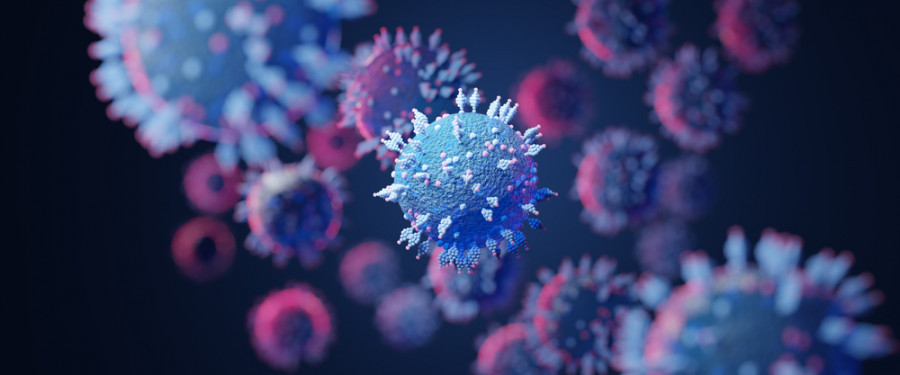Health
Children also at high risk of Covid and they are not vaccinated
As Omicron is spreading, experts say vaccines for 5-11 year-olds should be acquired soon.
Arjun Poudel
Last week, a six-month-old baby girl was rushed to Chabahil-based Om Hospital after suffering from respiratory problems.
The infant exhibited Covid-19 like symptoms—fever, runny nose, cough and sneezing. The kid, who doesn’t qualify for a Covid-19 vaccine yet, most likely acquired the virus from her infected mother.
“The patient’s parents called me for help, but I too was in isolation due to infection,” Dr Rita Hamal, a consultant pediatrician, told the Post.
“I suggested they take the baby to a hospital with pediatric intensive care service. They admitted the patient to Ishan Children and Women’s Hospital later.”
According to Hamal, the mother had avoided receiving Covid vaccine during her pregnancy, fearing side effects. She didn’t take the jab even after giving birth, assuming it would adversely affect the child while breastfeeding.
Children have not been spared in the ongoing surge driven by the highly contagious Omicron variant. The infection rate among children has increased in the past two weeks. As many as 500 children under 18 have tested positive daily.
According to the US Centers for Disease Control and Prevention (CDC), most newborns who test positive for the coronavirus have mild symptoms or none at all and recover, but serious cases have also occurred.
The Omicron variant is responsible for 88 percent of new infections in Nepal, according to the Health Ministry. It is expected that the fast-spreading variant will soon displace the Delta variant. Earlier, the ministry had also projected that new infections could reach upto 20,000 a day.
While the number of children visiting hospitals with Covid-19 like symptoms has increased amidst record breaking daily surge, there has been no breakthrough, however, in purchasing the vaccine for children between five and 11 years old despite government assurances.
According to doctors attending the infected patients in major hospitals designated for the treatment of Covid-19, most of the severe patients currently receiving treatment are either unvaccinated or partially vaccinated.
The children, most of whom are yet to receive the first dose if they qualify for a vaccine, are highly vulnerable to Covid-19. Protecting children, especially infants, toddlers, and preschoolers, has sent parents scrambling as no Covid-19 vaccine has been approved for kids under five yet.
“Children are getting infected from their parents and elders,” said Dr Baburam Marasini, former director at the Epidemiology and Disease Control Division.
“Several countries have already started inoculating children between five and 11 years old. Children of the said age group are highly vulnerable to the infection. Even if they do not get severely ill, they will pass the infection to elders and elderly people at home.”
Experts say that vaccination is the only proven intervention to lessen the severity and deaths from the Covid-19 infection, now and in future.
“Even if the ongoing third wave, driven by the Omicron variant, ends, there is no guarantee that another wave will not come,” Dr Biraj Karmacharya, an epidemiologist, told the Post.
“Providing vaccines to the maximum number of people is the only way to lessen the loss. As the government has already decided to inoculate children between five and 11, authorities concerned should make a deal at the earliest so that we can secure our population.”
Nepal’s vaccination rate has slowed down despite having sufficient doses in stock. On Monday, only 119,371 people received the jabs throughout the country. The number was 49,473 on Sunday.
The Ministry of Health and Population has started inoculating children between 12 and 17 from December 20 with the Moderna vaccine supplied by the COVAX facility, the United Nations-backed international vaccine sharing scheme. The facility had supplied 3,712,000 doses of the Moderna vaccine.
Health authorities had also administered some children of the said age group from 20 districts, including the three districts of Kathmandu Valley—Kathmandu, Bhaktapur and Lalitpur, with Pfizer-BioNTech vaccine supplied by COVAX.
Vaccination of children of the said age group continues in schools of several districts.
Meanwhile, officials at the Health Ministry said they are working to secure a deal to purchase 8.4 million doses of Pfizer-BioNTech vaccine for children between five and 11 years old.
“We are working to sign a deal to purchase 8.4 million doses of vaccine for children between five and 11 years old,” Dr Surendra Chaurasia, chief of the Logistic Management Section under the Department of Health Services, told the Post.
“We are trying but a deal has yet to be reached.”
Nepal needs to vaccinate around 27 million of the little over 30 million population, as around three million are children under five years of age.
Authorities had decided to inoculate children between five and 11 but no deal has been reached to purchase vaccines for them.
Nepal has received 42,048,840 doses of Covid-19 vaccines—AstraZeneca, Vero Cell, Moderna, Janssen and Pfizer-BioNTech.
Until now, 12,966,362 people or 42.7 percent of the total population, have been fully vaccinated. The Health Ministry said that 168,969 people have taken booster shots as of Saturday.
On Monday, 10,319 people tested positive—8,054 in 16,654 polymerase chain reaction tests and 2,265 in 4,547 antigen tests.
In the last 24 hours, four people died from Covid-19. Active cases stand at 82,550. Of them, 80,779 people are in home isolation.




 11.84°C Kathmandu
11.84°C Kathmandu















